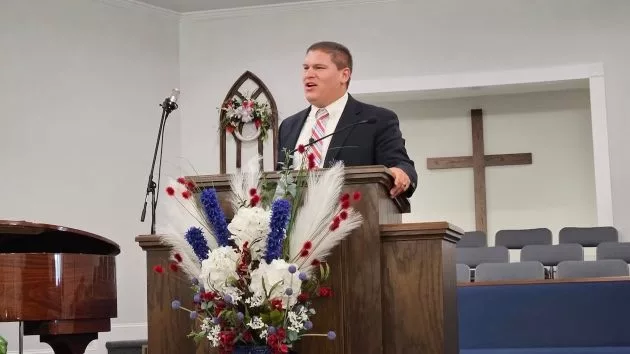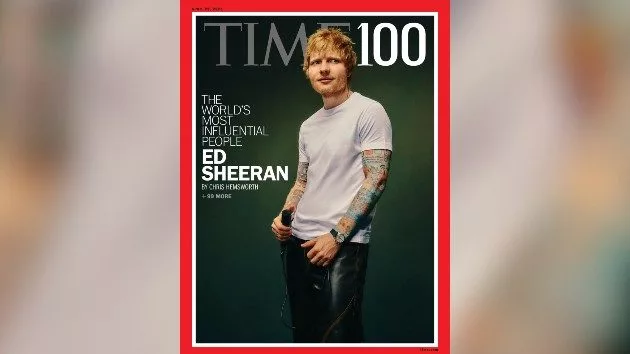
(NEW YORK) — Moments after a bomb explosion by a Russian drone in Kyiv Oblast, Ukraine, Benjamin Hall found himself on the ground covered in his own blood, his right leg barely hanging from his body. His colleagues were similarly injured, lying nearby and close to death.
Despite the chaos, instinct kicked in and Hall, a war correspondent for Fox News, fumbled to find his phone to film a video.
“In one sense, it’s inherent” in all journalists to report the news, he told ABC News.
“SAVED: A War Reporter’s Mission to Make it Home,” a book Hall later wrote to document his experience, is a continuation of that instinct. It’s been 12 months since the explosion that claimed the lives of his colleagues and left 17% of his body burned. The book, he said, became part of his personal catharsis to confront what had happened to him.
“I knew I had to face it,” he said. “Writing the book was part of the recovery.”
The book began in the form of voice notes he made on his phone while hospitalized and undergoing major surgery. Ten percent of his burns are third degree and his right leg required amputation. He lost his left foot and sight in one eye. Eventually, Hill required prosthetics for both legs and would need to learn to walk again.
Up to that point, being close enough to danger to report on it with accuracy had become a way of life. He covered conflicts all over the world between 2007 and 2015 when he joined Fox News as a correspondent out of the network’s London bureau. He began to feel less comfortable at home than being in the field.
“No other work really felt satisfying or really important,” he said.
It wasn’t until marriage and children forced him to balance the two worlds. “The work of covering wars is very important. I do understand the need to keep doing it and I also understand the need to stay home and be safe,” he said.
Fox offered him a respite from the battlefield in 2021 when he became the channel’s U.S. State Department correspondent and moved to Washington. In February 2022, at the beginning of Russia’s invasion of Ukraine, he said he felt called to report from the field.
“It was a decision I made quickly,” he said. “I never had a moment of regret making that decision to go.”
Journalists becoming targets
The war in Ukraine has proven deadly for journalists. According to a 2022 report by Reporters Without Borders, an international nonprofit, about 1,700 journalists have been killed globally over the last 20 years, an average of more than 80 a year. Eight journalists were killed last year alone in Ukraine, compared with 12 deaths in that country over the last two decades. After Russia, the organization ranks Ukraine as the most dangerous country in Europe for journalists, followed by Turkey.
According to international law, the intentional killing of civilians, which includes journalists, is considered a war crime. Hall, however, said the “press is targeted more than the way it used to be.”
He also said the number of journalists covering conflicts has increased, raising the likelihood of danger. Over his career, at least six of his colleagues have died in their work, which includes Fox cameraman Pierre Zakrzewski and producer Oleksandra “Sasha” Kuvshynova who were with him on the day of the attack. Zakrzewski was a kind of mentor, he said.
“You can only work in those parts of the world if you totally, 100% trust each other and we developed a relationship that was incredibly deep. You have conversations you might not have with anyone else,” he said. “[Pierre] was someone who wanted to explore as many cultures and societies as much as he could. I learned that from him.”
This week Fox Corp CEO Lachlan Murdoch announced a $1 million donation to the American Red Cross to support ongoing global Ukrainian relief efforts.
Finding optimism
Today, while based in London, Hall is dealing with daily medical care, upcoming operations and learning “to live with a bit of pain.” It remains a struggle to walk and serious burns cover the bottom half of his body. Despite those challenges, he said he is driven to “find my own optimism” and to “pass it on to those who don’t have it.”
“I try to enjoy the small things in life: sunlight, a beautiful walk, great music. Maybe the attack made me realize the many things I once thought were problems don’t feel like problems anymore,” he said. “Nothing else matters. That’s what I want every day.”
Copyright © 2023, ABC Audio. All rights reserved.



